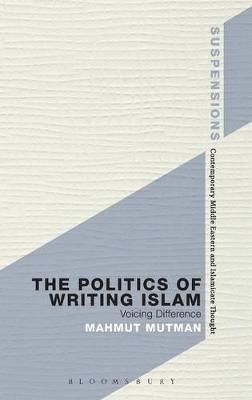
The Politics of Writing Islam
Voicing Difference
Seiten
2013
Bloomsbury Academic USA (Verlag)
978-1-4411-6524-4 (ISBN)
Bloomsbury Academic USA (Verlag)
978-1-4411-6524-4 (ISBN)
The Politics of Writing Islam provides a much-needed critique of existing forms of studying, writing and representing Islam in the West. Through critiquing ethnographic, literary, critical, psychoanalytic and theological discourses, the author reveals the problematic underlying cultural and theoretical presuppositions.
The Politics of Writing Islam provides a much-needed critique of existing forms of studying, writing and representing Islam in the West. Through critiquing ethnographic, literary, critical, psychoanalytic and theological discourses, the author reveals the problematic underlying cultural and theoretical presuppositions. Mutman demonstrates how their approach reflects the socially, politically and economically unequal relationship between the West and Islam.
While offering a critical insight into concepts such as writing, power, post-colonialism, difference and otherness on a theoretical level, Mutman reveals a different perspective on Islam by emphasizing its living, everyday and embodied aspects in dynamic relation with the outside world - in contrast to the stereotyped authoritarian and backward religion characterized by an omnipotent God.
Throughout, Mutman develops an approach to culture as an embodied, everyday, living and ever changing practice. He argues that Islam should be perceived precisely in this way, that is, as an open, heterogeneous, interpretive, multiple and worldly belief system within the Abrahamic tradition of ethical monotheism, and as one that is contested within as well as outside its 'own' culture.
The Politics of Writing Islam provides a much-needed critique of existing forms of studying, writing and representing Islam in the West. Through critiquing ethnographic, literary, critical, psychoanalytic and theological discourses, the author reveals the problematic underlying cultural and theoretical presuppositions. Mutman demonstrates how their approach reflects the socially, politically and economically unequal relationship between the West and Islam.
While offering a critical insight into concepts such as writing, power, post-colonialism, difference and otherness on a theoretical level, Mutman reveals a different perspective on Islam by emphasizing its living, everyday and embodied aspects in dynamic relation with the outside world - in contrast to the stereotyped authoritarian and backward religion characterized by an omnipotent God.
Throughout, Mutman develops an approach to culture as an embodied, everyday, living and ever changing practice. He argues that Islam should be perceived precisely in this way, that is, as an open, heterogeneous, interpretive, multiple and worldly belief system within the Abrahamic tradition of ethical monotheism, and as one that is contested within as well as outside its 'own' culture.
Mahmut Mutman teaches cultural and critical theory and is the co-ordinator of the Program in Cultural Studies at Istanbul Sehir University, Turkey. He has widely published on orientalism, postmodernism, nationalism, and Islam.
Introduction
Part I: Ethnographies: Writing Culture
1. Writing Culture: the Name of Man
2. Native Speaker, Master Audience
3. Exchange Past and Future
Part II: Literatures: Crossing Culture
4. Resonance of Light: Reading T.E. Lawrence
5. Nomadism or Sovereignty: Location of Culture
Part III: Theologies: the Voice of the Other
6. Orphan Religion
7. Reciting: the Voice of the Other
Conclusion
Bibliography
Index
| Erscheint lt. Verlag | 21.11.2013 |
|---|---|
| Reihe/Serie | Suspensions: Contemporary Middle Eastern and Islamicate Thought |
| Verlagsort | New York |
| Sprache | englisch |
| Maße | 156 x 234 mm |
| Gewicht | 558 g |
| Themenwelt | Geisteswissenschaften ► Religion / Theologie ► Islam |
| ISBN-10 | 1-4411-6524-X / 144116524X |
| ISBN-13 | 978-1-4411-6524-4 / 9781441165244 |
| Zustand | Neuware |
| Haben Sie eine Frage zum Produkt? |
Mehr entdecken
aus dem Bereich
aus dem Bereich


